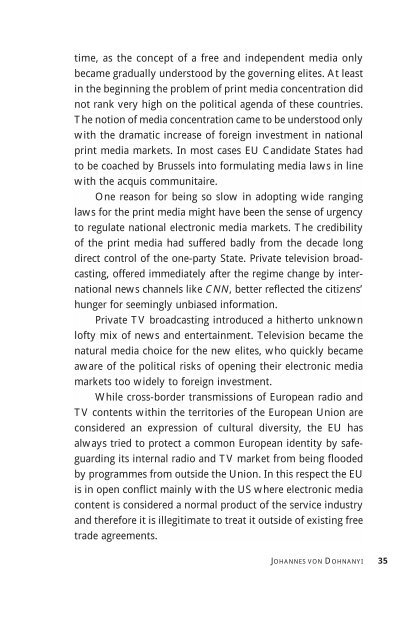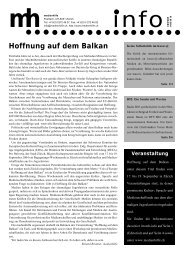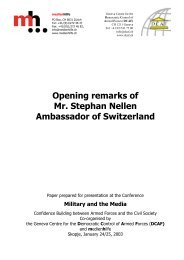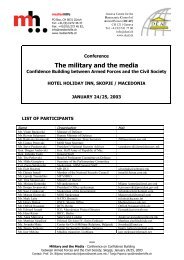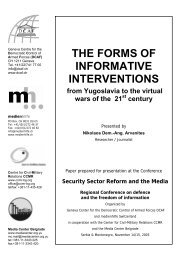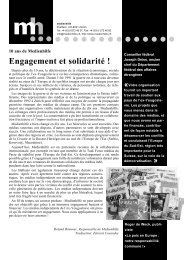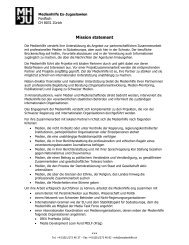The Impact of Media Concentration on Professional ... - OSCE
The Impact of Media Concentration on Professional ... - OSCE
The Impact of Media Concentration on Professional ... - OSCE
You also want an ePaper? Increase the reach of your titles
YUMPU automatically turns print PDFs into web optimized ePapers that Google loves.
time, as the c<strong>on</strong>cept <str<strong>on</strong>g>of</str<strong>on</strong>g> a free and independent media <strong>on</strong>lybecame gradually understood by the governing elites. At leastin the beginning the problem <str<strong>on</strong>g>of</str<strong>on</strong>g> print media c<strong>on</strong>centrati<strong>on</strong> didnot rank very high <strong>on</strong> the political agenda <str<strong>on</strong>g>of</str<strong>on</strong>g> these countries.<str<strong>on</strong>g>The</str<strong>on</strong>g> noti<strong>on</strong> <str<strong>on</strong>g>of</str<strong>on</strong>g> media c<strong>on</strong>centrati<strong>on</strong> came to be understood <strong>on</strong>lywith the dramatic increase <str<strong>on</strong>g>of</str<strong>on</strong>g> foreign investment in nati<strong>on</strong>alprint media markets. In most cases EU Candidate States hadto be coached by Brussels into formulating media laws in linewith the acquis communitaire.One reas<strong>on</strong> for being so slow in adopting wide ranginglaws for the print media might have been the sense <str<strong>on</strong>g>of</str<strong>on</strong>g> urgencyto regulate nati<strong>on</strong>al electr<strong>on</strong>ic media markets. <str<strong>on</strong>g>The</str<strong>on</strong>g> credibility<str<strong>on</strong>g>of</str<strong>on</strong>g> the print media had suffered badly from the decade l<strong>on</strong>gdirect c<strong>on</strong>trol <str<strong>on</strong>g>of</str<strong>on</strong>g> the <strong>on</strong>e-party State. Private televisi<strong>on</strong> broadcasting,<str<strong>on</strong>g>of</str<strong>on</strong>g>fered immediately after the regime change by internati<strong>on</strong>alnews channels like CNN, better reflected the citizens’hunger for seemingly unbiased informati<strong>on</strong>.Private TV broadcasting introduced a hitherto unknownl<str<strong>on</strong>g>of</str<strong>on</strong>g>ty mix <str<strong>on</strong>g>of</str<strong>on</strong>g> news and entertainment. Televisi<strong>on</strong> became thenatural media choice for the new elites, who quickly becameaware <str<strong>on</strong>g>of</str<strong>on</strong>g> the political risks <str<strong>on</strong>g>of</str<strong>on</strong>g> opening their electr<strong>on</strong>ic mediamarkets too widely to foreign investment.While cross-border transmissi<strong>on</strong>s <str<strong>on</strong>g>of</str<strong>on</strong>g> European radio andTV c<strong>on</strong>tents within the territories <str<strong>on</strong>g>of</str<strong>on</strong>g> the European Uni<strong>on</strong> arec<strong>on</strong>sidered an expressi<strong>on</strong> <str<strong>on</strong>g>of</str<strong>on</strong>g> cultural diversity, the EU hasalways tried to protect a comm<strong>on</strong> European identity by safeguardingits internal radio and TV market from being floodedby programmes from outside the Uni<strong>on</strong>. In this respect the EUis in open c<strong>on</strong>flict mainly with the US where electr<strong>on</strong>ic mediac<strong>on</strong>tent is c<strong>on</strong>sidered a normal product <str<strong>on</strong>g>of</str<strong>on</strong>g> the service industryand therefore it is illegitimate to treat it outside <str<strong>on</strong>g>of</str<strong>on</strong>g> existing freetrade agreements.JOHANNES VON DOHNANYI 35


